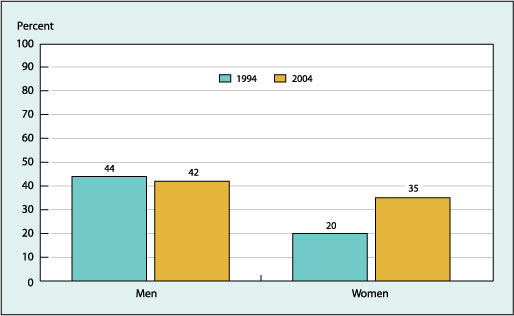Health Insurance
In the past, many employers allowed employees to continue their health insurance
into retirement, either as the standard group policy or as a supplement to Medicare.
Some employers report that this practice has become less common, as health care
has become more expensive and accounting standards require promises to employees
be recorded as liabilities.
Chart 8. Percentage of people aged 55–64 with employer-based retiree health insurance
by sex, 1994 and 2004

Note: Employer-based retiree health insurance is health insurance
that will continue after an employee leaves his/her job. The measure used here includes
former employees who have left their job and current employees who expect insurance
to continue after leaving. The measure also counts coverage from a spouse’s employer-based insurance that continues after
employment stops.
Source: Health and Retirement Study.
- The percent of people with employer-based retiree health insurance,
either through their own or through their spouse’s employer, varies by sex. In 2004,
42 percent of men aged 55–64 had employer-based retiree health insurance compared
to 35 percent of women.
- While the percentage of men who will have this type of health
insurance when they retire has remained relatively stable over the past ten years,
the percentage of women with this type of health insurance has increased substantially
from 20 percent in 1994 to 35 percent in 2004.
- Although most adults have some type of health insurance (public,
private, or other), in 2006, 11 percent of people aged 55–64 had no health insurance
coverage.
Last Modified: 12/31/1600 7:00:00 PM